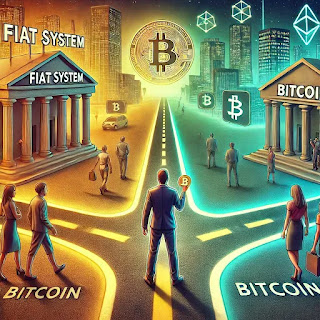Why Fiat Makes Everything Feel Cheap—Even Morality
Ever feel like the world has gone hollow?
Like the air is thin in places it used to feel rich. Like every conversation is a transaction, every relationship is one misstep away from ghosting, every apology is prepackaged and insincere.
That feeling isn't in your head. It's in the money.
When you live in a system where the money is fake, so is everything else.
Inflation isn't just an economic phenomenon. It's a psychological one. It's a cultural virus. It seeps into the walls of our homes, the fabric of our decisions, and yes, even the ethics we pretend to hold dear.
History tells the tale. When money held its value—when gold backed the system—people thought in generations, not quarters. Cathedrals took a century to complete. Roman aqueducts still stand today. Now? We build strip malls to be bulldozed in ten years. When money is weak, vision gets short-sighted.
Because when money is constantly losing value, time begins to feel cheap. Effort feels futile. Promises become placeholders. Why build a bridge when the land underneath it is sinking?
Think about it. If you know your paycheck will be worth less next year, do you save it? Or do you spend it fast on something fleeting? If you're forced to run faster just to stand still, when do you have time to slow down and think about right and wrong?
The fiat system turns morality into a luxury. Something you can afford when your bills are paid and your fridge is full. But when the system rigs itself against you, when rent rises and wages don’t, when truth takes too long and a lie gets you ahead, what choice do people really have?
They cut corners. They inflate their resumes. They ghost their commitments. They sell cheap because they’re priced that way.
Look at Weimar Germany. Zimbabwe. Venezuela. In every case, hyperinflation didn't just wreck economies—it shattered trust. Neighbors turned on each other. Stores shut their doors. Crime surged. When the money collapsed, the social contract went with it.
Even culture becomes commodified. Morality gets monetized. And anything that doesn't scale becomes obsolete. Fast food values. Disposable ethics.
Now enter Bitcoin.
A fixed supply. A system where time is preserved, not degraded. Where you can't cheat the code, can't inflate the ledger, can't fake the work.
In Bitcoin, value is earned. Proof-of-work isn't just a protocol. It's a principle. It says: you want something real? Then do something real.
Some argue that deflationary money like Bitcoin will lead people to hoard, freezing the economy. But let’s flip that. People hoard what they value. You don’t spend your time or your integrity recklessly. Sound money inspires patience. Fiat forces haste.
That's why this technology hits so deep. It’s not about price. It’s about principle. It’s about putting weight back into the world—into time, into promises, into character.
Fiat strips the soul. Bitcoin restores the weight of being.
The shift won’t happen overnight. But it doesn’t need to. Every person who opts into Bitcoin is choosing signal over noise, weight over fluff. The revolution happens wallet by wallet. Block by block.
I used to live paycheck to paycheck—not just in money, but in mindset. I didn’t plan. I reacted. Bitcoin taught me to think long-term. To invest in myself like I invest in hard money: slowly, deliberately, with conviction.
Want to fix the world? Fix the foundation. Fix the money.
Because when value is real again, so are we.
Tick tock. Next block.




Comments
Post a Comment